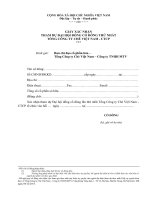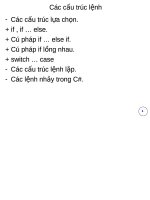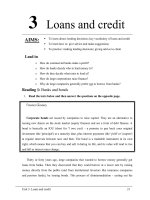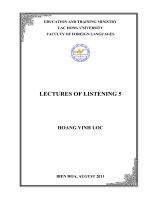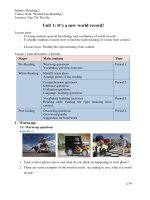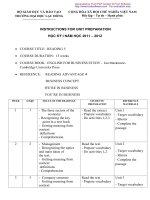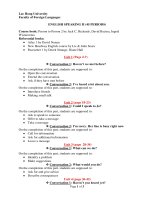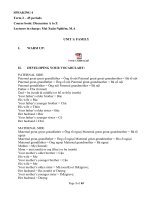Com LISTENING 3 VB1 PTNGHIA WEEK 2
Bạn đang xem bản rút gọn của tài liệu. Xem và tải ngay bản đầy đủ của tài liệu tại đây (550.3 KB, 5 trang )
Subject: Listening 3
Teacher: Pham Thi Nghia
UNIT 2
Activity 1
EDUCATION
[1], page 19, unit 4, Talk Time 3 by Susan Stempleski
Look at the pictures. Answer these questions
1. What are your favorite subjects?
2. What subjects don’t you like? Why?
3. What is the most difficult subject for you in school?
4. Have you ever cut classes because of boredom? If yes, how many times?
5. What language class do you like the most? Why?
6. Why do you choose this major?
Activity 2
Stempleski
[1], page 20 and 23, unit 4, Talk Time 3 by Susan
Listen to the two conversations and answer the following questions?
Page 1 of 5
Conversation 1
[1], page 20, unit 4, track 29 CD1, Talk Time 3 by Susan
Stempleski
1. What subject does the girl like?
2. How does she like about her class?
3. Does the boy like art?
4. What is the boy going to do?
Conversation 2
[1], page 23, unit 4, track 33 CD1, Talk Time 3 by Susan
Stempleski
1. When did the boy start the semester?
2. How many tests has he taken?
3. How many tests has the girl taken?
4. What test are they going to take on Friday?
5. What is the boy doing today?
6. What are they going to do tomorrow?
Activity 3
[2], page 16, unit 2, Boost 1 listening by Jason Renshaw and Wade O.
Nichols
Activity 4
Let’s Listen
[3], page 23, unit 5, track 22 CD1, Let’s Talk 3 by Leo Jones
Page 2 of 5
Activity 5
Page 3 of 5
Here are the scores and the evaluation for the quiz
Activity 6
VOA News
Listen and fill in the missing words or phrases
Studying in the US: A Lesson in Personal Finance
A question from the teacher. Susanna Wesson writes: "I teach English to French
………………………….(1) who benefit very much from your Foreign Student Series.
Could you do a program on money, banking and shopping for students in the U.S.?"
Many colleges and universities in the United States have…………………..(2) for what they
consider reasonable budgets for personal spending.
Senem Bakar is the …………………………………(3) of International Student Services at
American University in Washington, D.C. She suggests that students budget at least one
thousand three hundred dollars for a nine-month school year. This will help pay for things
like transportation, telephone bills, supplies and entertainment.
Paul Butler is the ……………………………….(4) in the Office of International Services at
Indiana University Bloomington. He says the advice there is to have at least two thousand
four hundred dollars for twelve months in the United States.
Indiana and many other schools also offer advice on ways to …………………………(5)
and save money. For example, for entertainment, look for free concerts or museums. Want
to go to a movie? Prices are usually lower in the daytime than at night.
American University advises students to check newspaper advertisements for sales and to
use ……………………………..(6) coupons. If a product is "on sale," that means it is being
offered for a limited time at a reduced price. Senem Bakar says students learn that in the
United States you can find almost everything on sale somewhere.
Also, many banks offer special services for students, like ……………………………….(7),
including a debit card. Debit cards can be used almost anywhere credit cards are accepted.
Millions of Americans now use a …………………………(8) or credit card, instead of
paper money or checks, to make most of their purchases.
Page 4 of 5
With a credit card, you are borrowing money every time you use it. Debit cards are
different. They are linked directly to a ………………………..(9) so you are paying with
your own money.
Debit cards, also known as check cards, do not have interest charges. But users are charged
if they try to spend more than the amount available in their account. These fees can be
costly even if you ……………………….(10) by just a few cents.
And that's the VOA Special English Education Report, written by June Simms. Earlier
reports in our Foreign Student Series are at voaspecialenglish.com. I'm Steve Ember.
Page 5 of 5
